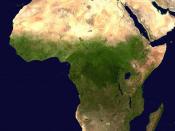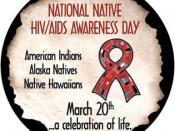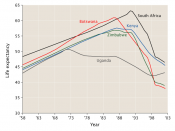AIDS has claimed the lives of over 2,000,000 people in Sub-Saharan Africa alone; the disease has orphaned 12,000,000 children in this region of Africa. At the end of 2005, 24,500,000 people were still living with this horrifying disease. Education, protection, and treatment for the afflicted are the solutions to this problem. In the absence of education commercial sex workers donÃÂt hesitate to work on the streets. In the absence of protection AIDS is contracted. Without treatment AIDS victims would undergo unnecessary suffering; they would perish much sooner than if they had been on medication.
AIDS is a disease of the immune system caused by infection with the retrovirus HIV, which destroys some types of white blood cells and is transmitted through blood or bodily secretions such as semen. Patients lose the ability to fight infections, often dying from secondary causes such as pneumonia or Kaposi's sarcoma. AIDS spreads swiftly throughout the continent of Africa due to the lack of sexual education and discussion.
In several areas intercourse is considered a private matter and is not, under any circumstances, discussed with anyone. Another aspect that aids the spread of this disease is the reluctance of civilians to use a prophylactic. Commercial sex workers are forced to accept clients whether they are willing to use a condom or not. Numerous women contract HIV this way at the hands of others who are either unaware they are HIV positive or care too little to do anything about it. The AIDS epidemic is ravaging the people of Angola, Benin, Botswana, Burkina Faso, Burundi, Cameroon, Central African Republic, Chad, Comoros, Congo, Côte d'Ivoire, Dem. Republic of Congo, Djibouti, Equatorial Guinea, Eritrea, Ethiopia, Gabon Gambia Ghana, Guinea, Guinea-Bissau, Kenya, Lesotho, Liberia, Madagascar, Malawi, Mali, Mauritania, Mauritius,Mozambique, Namibia, Niger, Nigeria, Rwanda, Senegal, Sierra Leone, Somalia, South Africa, Swaziland, Togo, Uganda, United Rep. Of Tanzania, Zambia, Zimbabwe, and citizens of even more of AfricaÃÂs nations.
AIDS is drastically altering the lives of the people it comes in contact with, and forever changing each country it invades. After undergoing decades of progress thus lengthening life expectancy, Africa had watched AIDS diminish their averages from somewhere around sixty to about fifty years of age. Many families have lost loved ones to AIDS, left to fend for themselves after the death of the income earner. Children are left to live in the slums at makeshift orphanages. AIDS impacts the labor force beyond comprehension. Victims, generally falling between the ages of fifteen and forty-nine, are at the prime of their working lives. Once ill, victims become too sick to work. Employers must train new workers and replace the afflicted or their business will suffer.
The AIDS epidemic is not a problem that can be solved overnight. International support is the first step. The United States can not tackle AIDS/HIV on its own. America needs the help of other powerful nations to save the lives of would-be victims and their children. Education, protection, and treatment for the afflicted are steps that must be taken. Schools should teach children at an early age the consequences of unprotected intercourse. Prophylactics, such as condoms, should be supplied at clinics for free for anyone who comes in off the streets. Free testing should be available to the public. Commercial sex workers should be required to use condoms and receive HIV tests periodically over the course of a year. If a woman or a man tests HIV positive, treatment should start as soon as necessary. This is where international support is needed. Africa cannot fund the medical treatments needed for AIDS/HIV victims. The victims themselves cannot afford the medicine; they depend on government funds to reimburse the hospitals and clinics. The United States has already issued a plan that would do wonders for the entire continent of Africa. The Department of State published a progress report stating, ÃÂIn the 15 focus countries, over the 5 years of the Emergency Plan we will provide anti-retroviral treatment for two million people living with HIV/AIDS; we will prevent seven million new HIV infections; and we will provide care to 10 million people who are infected or affected by the disease in the focus countries, including orphans and vulnerable children.ÃÂ This plan is exactly what Africa needs. The United States must show them that AIDS/HIV is a disease they can fight. Once shown how to avoid the disease and treat the infected hopefully Africa will establish its own plan and put it into action.
As previously stated, education, prevention, and treatment are the solutions to the AIDS outbreak in Africa. With AIDS claiming the lives of hundreds of people every day, fighting is AfricaÃÂs only hope for a bright future. The continent as a whole is attempting to battle the AIDS epidemic, but they need support. There may not be a cure for the disease, but treatment greatly reduces the suffering and extends the life expectancy of someone who is HIV positive. Together, nations from around the world can tackle this outbreak. Ashley Judd spoke wisely of the need for more than simply abstinence in saying, ÃÂAbstinence, being faithful, and correct, and consistent condom use are the only ways to successfully reach everyone when discussing HIV prevention. I believe that the abstinence message alone does not solve the AIDS epidemic.ÃÂ"AIDS and HIV Statistics for Sub-Saharan Africa." Avert. 31 July 2007. 2 Nov 2007 .
"Ashley Judd Quotes." Brainy Quotes. 2007. 2 Nov 2007 .
Blanc, Jon. "Aids-African Solutions." Aids-African Solutions. 24 June2007. 2 Nov 2007 .
"CNN.com transcripts-Sunday Morning News." CNN.com. 12 Feb 2001. 2 Nov 2007 .
Tobias, Ambassador Randall L. . "Fighting AIDS in Africa: A Progress Report." Department of State. 7 Apr 2004. 2 Nov 2007 .





